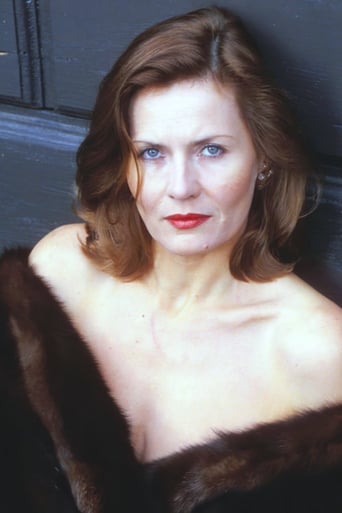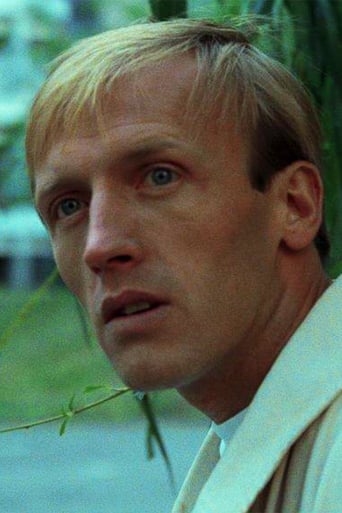Solemplex
To me, this movie is perfection.
Dynamixor
The performances transcend the film's tropes, grounding it in characters that feel more complete than this subgenre often produces.
Stephan Hammond
It is an exhilarating, distressing, funny and profound film, with one of the more memorable film scores in years,
Edison Witt
The first must-see film of the year.
TheLittleSongbird
As said in my review of 'A Short Film About Killing', the more work I see of Krzysztof Kieslowski, the stronger the feeling that he was an incredibly gifted director, responsible for some brilliant work, taken from us too soon.Have yet to see anything bad from him, with even my least favourite (the eighth episode of 'Dekalog') still being very good, with the masterful 'Dekalog' and 'Three Colors: Red' (all three "Three Colors" films are must watches, but especially 'Red') being particularly great. Like 'A Short Film About Killing' was an expansion of Episode 5 of 'Dekalog', 'A Short Film About Love' is an expanded feature length version of Episode 6 (to me like Episode 5 one of the best 'Dekalog' episodes).Granted, 'A Short Film About Love' is not for everybody and it is easy to understand why. It seems to have been mistaken for a depressing take on romantic love, to me while there is love and passion (being two of the main themes of Episode 6 of 'Dekalog') it is a more complex and darker interpretation of "love" but is actually much more than that. Often it is more a film about obsession, forgiveness, lust and heartache. People may easily dismiss 'A Short Film About Love' as pessimistic and dispassionate, perverted has even been used, while others find it beautiful, haunting and moving. Belong in the latter category myself.Kieslowski's films are all visually striking and exceptionally well made. The same can be said for 'A Short Film About Love'. As well as being beautifully shot with atmospheric use of colour to match the mood, it is gritty yet beautiful with many thoughtful and emotionally powerful images lingering long into the memory. Kieslowski's direction is quietly unobtrusive, intelligently paced and never too heavy, and the music is suitably intricate.The themes and ideals are used to full potential, and the characters and their relationships and conflicts feel so real and emotionally resonant without being heavy-handed. Despite being based around one of the ten commandments, don't let that put you off, resemblance to religion is relatively scant, unless anybody argues God's seeming love for sinners. Being a non-religious person that's not for me to say, just mentioning an interesting and quite unusual observation read recently about the film.Story-wise, it's deliberate in pace but rich and provocative. It's never dull, and more often than not it's creepy (like Magda being followed out of the post-office), poignant (Tomek on the roof, Magda in tears after knocking over milk and the heart-wrenching fantasy about what life might have been with him). There is even some nice black humour that is so subtle it's easy to miss.'A Short Film About Love's' themes of obsession, stalking, lust, love, passion, forgiveness and heartache are expertly explored, likewise with the characterisations and interactions. The acting is superb as to be expected from both the two leads, again the complexity and nuances of the performances is to be admired.Overall, another masterpiece from Kieslowski though one of his most divisive. 10/10 Bethany Cox
bandw
(Spoilers) Magda's apartment is across a courtyard from Tomek's. Outside of working as a clerk in the local post office Tomek's main passion is spying on Magda through his telescope. As shy as he is, he is driven by his obsession to establish contact with Magda.I view this movie as more of a parable than as a believable drama. Would Magda leave all of her windows curtain-less? Would she not flee her stalker? At first I fluctuated between being made very uncomfortable by Tomel's voyeurism, but came to understand that his obsession arose from an immature concept of love as platonic--he answers "no" to Magda's questioning if he wants to kiss her or have sex with her. Magda is coming from the opposite position of feeling that love does not exist, only sex. In the intense crucial scene where Magda gently seduces Tomek by merely placing his hands on her thighs, Tomek is stimulated to the point of having an orgasm while still fully clothed. This so shatters his concept of love, and of himself, that he runs away and later attempts suicide.On Magda's side, when she comes to understand just how powerfully Tomek felt about her, she realizes that her feelings for him have been more than sexual.Had both Tomek and Magda come at their encounter with the idea that love has both platonic and sexual aspects, then maybe they could have had something meaningful between them. The movie ends with Magda envisioning what could have been.Zbigniew Preisner's rather sentimental and repetitive score is a bit of a departure from his more commonly operatic formalism, but effective nonetheless, with the themes reflecting the storyline.
Dennis Littrell
The only criticism I would have of this enthralling Polish language film by the great Polish-French director Krzysztof Kieslowski is his use of the "opened window" conceit. Magda (Grazyna Szapolowska) is a woman who lives alone in a high rise housing development. She is sexy and cynical to the point of not believing in love. To her it is all desire, and the fulfillment or frustration of desire. Across the way from her lives a virginal young man by the name of Tomek (Olaf Lubaszenko) who has been spying on her from his apartment window through a telescope.He lives with a friend's mother (Stefania Iwinska) who looks after him as her own son. He works in the post office and obsesses about Magda's life. He watches her with her beaux. He even goes so far as to write a couple of phony money order slips for her and put them in her mailbox just so she will have to go to his window and ask about them. When she does he is able to examine her features closely. Is his an obsession or is it love? Kieslowski's answer is that it is love, love with the kind of depth and feeling that Magda cannot even imagine until she experiences it. And then she is amazed and dumbfounded.The key scene in the movie occurs when Tomek is finally able to be together with the object of his love, in her apartment, with her telling him that "When a woman wants a man she gets wet inside." And she invites him to check it out, so to speak. But what happens does not lead to any kind of fulfillment. Instead Tomek is inadvertently humiliated.And that's the story, more or less. As usual with Kieslowski, human feelings predominate and are stark and one might say conflicted--the conflict arising between humankind's baser instincts and the more civilized ones of society. What he does here is turn the stalker into the saint, in a sense, and the object of his love into something unworthy of that love.The question might arise: is it realistic to believe that a woman would leave her windows open and her lights on for all to see inside while she goes about her private life? No, it isn't. But we have to accept this device. After that the film is fully realistic to the point of even being mundane in its depiction of middle class city life. The characters are ordinary and even a little boring except for Tomek's supreme obsession. It is this "jewel" in the heart of the Polish city that lifts his life and her life above the ordinary. Even though we know that she is too old and too world-weary for him and that he is too hopelessly young and inexperienced for her for lasting love to ever bloom between them, we cannot help but think how wonderful it would be if we could all feel as he does, or be the object of such love.Usually when this theme is worked out it is the obsessed who suffer greatly, it is the obsessed who are to be pitied--and we do to some extent feel something close to that for Tomek. But here it is Magda who we end up pitying the more because of her inability to love. Compared to Tomek she is a deprived creature who will never find true happiness--unless she learns this lesson she has gotten from this young man whose passion for her was unlike anything she had ever experienced before.And this is Kieslowski's point: it is not only better to have loved and lost than never to have loved at all. It is only through love that we can truly identify with another human being. We see this in the scene where Madga is looking through Tomek's telescope into her apartment window and recalling what he had seen one day, the day that she had come home and spilled the milk and sat at the table crying over that spilled milk (very typical of Kieslowski to use such an obvious, but telling and entirely apt cliché) after a breakup with one of her boyfriends. In memory she sees Tomek looking at her crying and running her finger through the spilled milk, and she realizes the depth of his commiseration with her and his love for her, and in her mind's eye she sees him beside her (as he truly was psychologically) with his hand on her shoulder and love in his heart.We might think that at some other time she will look back on a relationship she had had in her life and realize that the failure was due to a lack of love on her part. Indeed she more or less reveals that to us when she tells Tomek's "Godmother" that no, she is not the right person for Tomek. We know that she is too cynical and would only use him temporarily for gratification, and that would be all.But I was left with the sense that Magda would indeed learn from her experience and would be transformed. There is this sense of hope and the possibility of emotional and spiritual growth that is often seen in the films of Krzysztof Kieslowski.(Note: Over 500 of my movie reviews are now available in my book "Cut to the Chaise Lounge or I Can't Believe I Swallowed the Remote!" Get it at Amazon!)
joel-280
This is an excruciatingly boring, slow-moving movie. We can feel some sympathy for the socially- and sexually-inexperienced and awkward Tomek, but the motivations of Magda are pretty hard to see, and the ending, at least for me, was inscrutable. Maybe it's about how we all need love, but I'd get more out of a good Busby Berkeley.I'm told that comments have to be at least ten lines, so I'll add that in the background are some interesting shots of the relationship between Polish citizens and government employees and institutions. I wonder if it's meant to portray this before or after the fall of the communist government.Finally, watch for the clever way the men from the gas company investigate whether or not there is a gas leak in Magda's stove.






